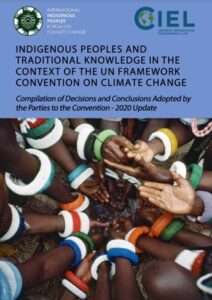
For decades, Indigenous Peoples have drawn upon knowledge and observations shared by their Elders and knowledge keepers and their reciprocal relationships with the natural world to raise awareness of the climate crisis. Their continued leadership has been essential to advancing rights-based frameworks during climate negotiations and is evident in documents such as the preamble of the Paris Agreement.
A rights-based approach — including commitments to uphold the minimum standards contained in the United Nations Declaration on the Rights of Indigenous Peoples — is essential to developing climate solutions grounded in equity, justice, and the self-determination of Indigenous Peoples.
Given their unique and critical role in climate negotiations, it is essential to understand Indigenous Peoples’ leadership with the United Nations Framework Convention on Climate Change (UNFCCC) and broader climate discourse.
This compilation lists all references to Indigenous Peoples and traditional knowledge in political documents adopted in 2019 by the Parties to the UNFCCC during the 25th Conference of the Parties (COP-25) and through its subsidiary bodies. It complements previous compilations published by the International Indigenous Peoples’ Forum on Climate Change and the Center for International Environmental Law. And it includes a compilation of references to Indigenous Peoples and traditional knowledge in documents adopted by key UNFCCC bodies.
